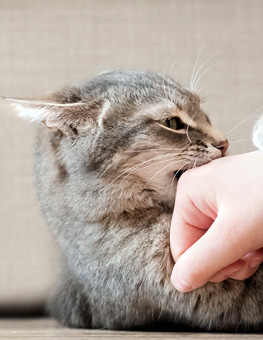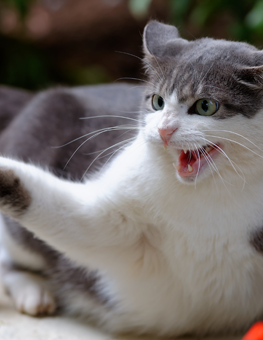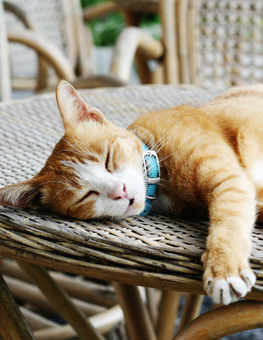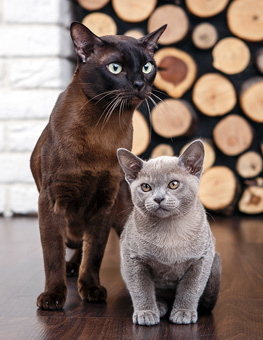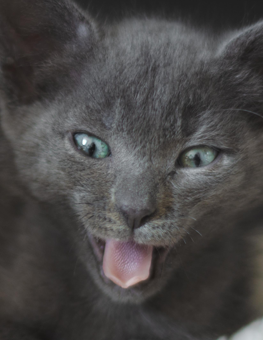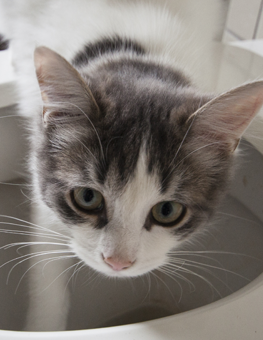Why Does My Cat Bite Me & How to Prevent It
It’s never a good thing when your cat is biting. It’s not just painful – it can potentially be dangerous if left unattended. Many cat bites require medical attention and can quickly become infected if left untreated.
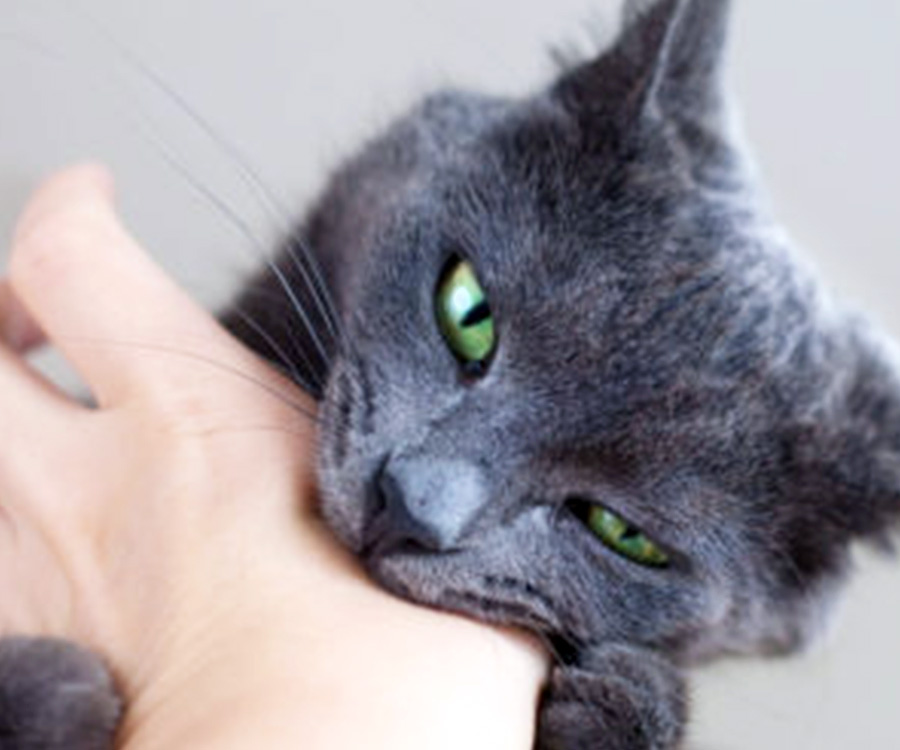

Cats bite because they are fearful, stressed, or frustrated. They do not act out of spite or anger.
Why Do Cats Bite Their Owners?
Cats bite because they are fearful, stressed, or frustrated. They do not act out of spite or anger. There is always a good reason (in their mind) behind the behavior.
It’s also important to note that declawed cats are more likely to bite than cats who have their claws, as their main defense mechanism has been taken away.
So how do you prevent your cat from biting? First, identify why your cat may be biting in the first place.
A Few Common Reasons Why Cats Bite & Stopping It
- Overstimulation (petting aggression)
- Play aggression / Frustration
- Fear, pain, and stress
- Communication
Your Cat Bites from Overstimulation
In order to keep yourself safe, it’s important to recognize subtle cues that a cat may be becoming agitated. Many cat owners don’t realize that their furbaby has already given them several warnings before the biting occurs. When petting and interacting with your cat, look out for:
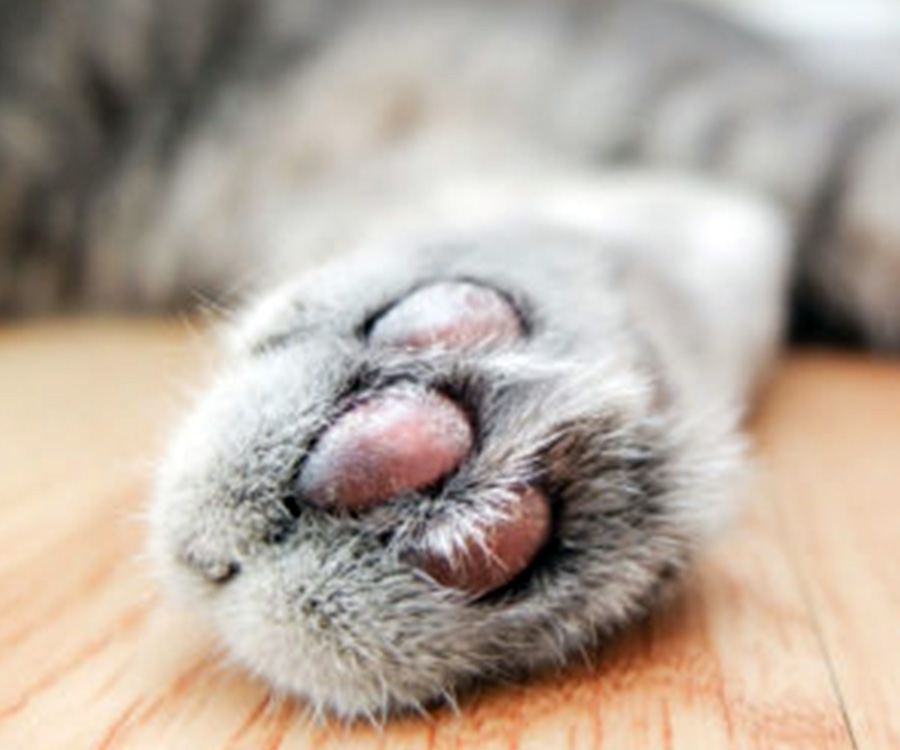

Declawed cats are more likely to bite than cats who have their claws.
- Twitching tail or skin
- Flattened ears
- Dilated pupils
- Head or eyes turned to look at your hand
- Stiff body
- Whiskers forward
These are all signs that your cat is becoming overstimulated with too much petting or attention and needs a break. For many cats, just the act of petting and stroking can be so stimulating that it can be hard for them to calm back down and behave appropriately.
Most cats will give several warnings before they escalate all the way up to a bite. You can decrease the chance of your cat biting you during petting by paying attention to his signals and allowing him to decide when he’s had enough.
Cats that Bite Because of Play Aggression
Play aggression is most commonly seen in kittens or young adults who are the only pet in the home. It usually occurs when the cat has been separated from his siblings at too young an age. It’s characterized by them ambushing your ankles as you walk around the corner or your cat biting your hands and feet seemingly out of nowhere.
When a kitten has a sibling or friend to play with they are able to teach each other how to play appropriately. When you see two kittens wrestling and squealing, they’re learning from each other just how many teeth and claws are acceptable during playtime. If a kitten isn’t given that outlet, they have to learn bite inhibition from humans instead. Here’s how to get a handle on your young cat biting for play:
- Avoid using your hands to play with your cat. It can be adorable to scratch your kitten’s belly while they kick and bite, but when they grow up to be adult cats, that same behavior isn’t cute anymore. If your cat is insistent on gnawing on your hands, have a small stuffed toy on hand that you can encourage them to bite instead.
-

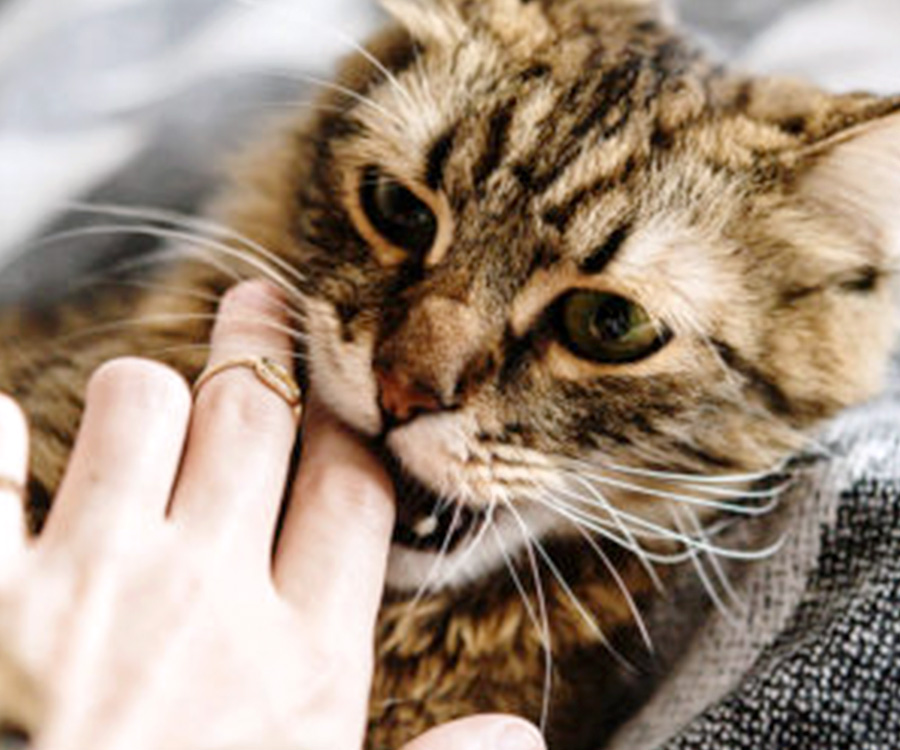
Play aggression, including cat biting, is commonly seen in young cats who are the only pet in the home.
If you’re bitten, to the best of your ability, stay still and don’t react. Put your hands behind your back and stand up. Completely ignore the cat’s bad behavior, and redirect their attention to an appropriate play outlet such as a feather wand instead. Repeat as necessary.
- Some cats will respond to a high pitched, “Ouch!” This sound mimics what a kitten sibling would make during too-rough play.
With play aggression, most cats bite out of frustration and boredom. Adding structured playtime to your routine of 15 minutes twice a day in the morning and evening can work wonders. Consider adding food puzzles and enrichment items like cat trees and cardboard boxes to your home as well. Cats love variety, so don’t keep the same toys out all the time. Instead, rotate their toys and keep cats interested in their environment.
Cat Biting Due to Fear, Pain, and Stress
Have you ever noticed that your cat acts differently at the vet? Your cat who is a perfect angel at home turns into a terror when you try to get him inside his carrier to go for that dreaded car ride. It’s not that he’s doing it on purpose – it’s much more likely that he’s afraid.
If you put your cat into a new or scary situation, they’re much more likely to bite. If you know that you have a vet visit coming up, or that there will be a major life change like a move to a new home or a new baby in the house, you can take some simple steps first to prepare your cat to make it as stress-free as possible.
- Teach children how to properly interact with your cat. If they are handling the cat roughly, chasing him until he feels cornered, or even just running around and being loud like kids do, your cat might feel pressured to bite. Allow your cat to have a safe spot in your home where he is not to be bothered and make sure kids and other visitors understand this.
- If your cat becomes very agitated when it’s time to go to the vet, you can teach your cat not to hate the carrier by leaving it out in the open (not hidden away in a closet until it’s time to go!) and filling it with soft blankets and yummy treats. Soon your kitty will learn that the carrier is a good thing and he won’t mind going inside!
- If your cat is suddenly biting you when they haven’t before, it is most likely pain-related. Cats are experts at hiding pain, so he may not show you any other signs that he’s hurting. Any sudden change in behavior, including biting, should be addressed by a veterinarian immediately.
- Know your cat and be able to recognize his needs. Cats are stressed when they are hiding constantly, over-grooming, not using the litter box, hissing or growling, or even trying to bite. If your cat is constantly stressed to the point where he is biting, you should talk to a certified cat behavior consultant or your veterinarian for help.
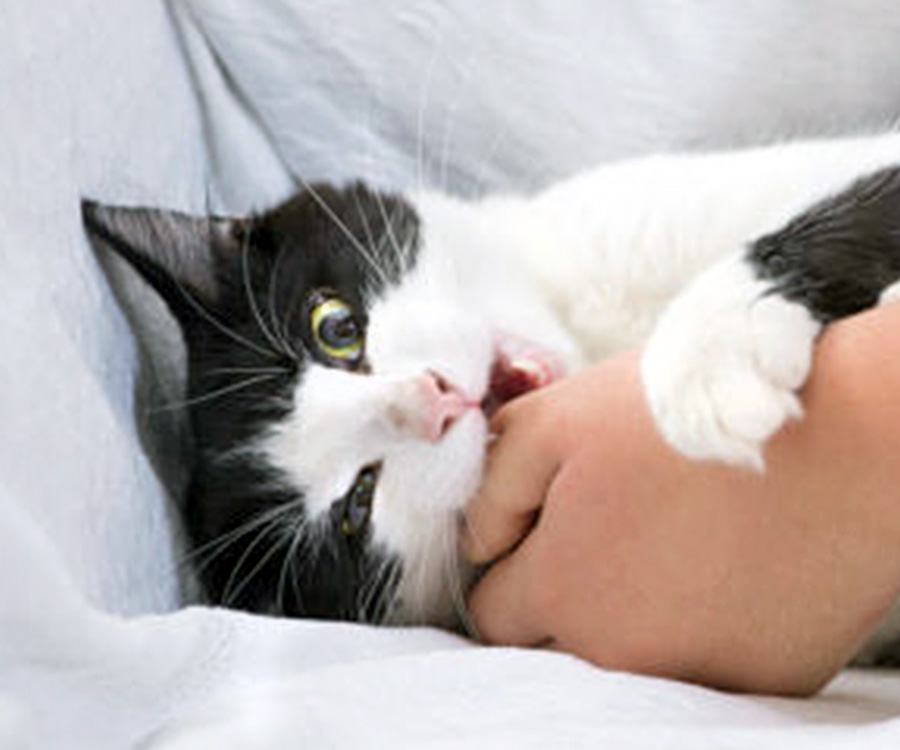

If your cat nips you they might be trying to get your attention.
A Cat Biting for Attention
Lastly, cats can use biting as a communication tool or a means to get attention. This type of biting is often the least severe – think “love nips” when you’ve stopped petting your cat when they want more. If your cat nips you and you keep petting him, that bite worked! He got what he wanted.
If your cat’s biting is more of an annoying behavior to communicate that he wants something, it’s easy to fix. Simply ignore your cat. Get up and walk away. When the cat is sitting calmly and not nipping, then give the cat what they want as a reward.
Do Not Punish Your Cat for Biting!
Above all, any type of punishment for your cat biting you is not recommended. Always respond calmly and do not further escalate the situation. Research shows that punishment, including yelling, squirt bottles, scruffing and physically hitting your cat is not effective and the cat does not learn from it.
The cat is unable to make the connection that the punishment is the consequence of the biting. You should ignore any unwanted behavior and praise good behavior. Any type of negative reaction will only further damage your relationship with your cat.
Content provided by Laura Cassiday






